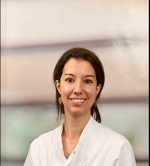Course Report
Lower gastro-intestinal radiation oncology: technical and clinical challenges for radiation oncologists - PDF Version
25-26 March, 2021 – online
Course director:
Claus Rödel, radiation oncologist, Johann Wolfgang Goethe University, Frankfurt, Germany
Recently I had the opportunity to participate in the European SocieTy for Radiotherapy and Oncology (ESTRO) course on lower gastro-intestinal (GI) radiation oncology. During residency I developed a specific interest in the lower part of the GI tract and as I am now in my final year of training, I was looking for a course to increase my skills and knowledge on this subject.
The course was very well attended with 68 participants from 27 countries. Because the course was completely digital due to covid measures, all teachers provided pre-recorded lectures that covered all the subjects that were included in the programme and they asked that we review these before the start of the course. Other homework included reading the recommended references, submission of two delineations (rectum and anus) and preparation of a patient case.
On the first day, all aspects of rectal cancer were addressed: magnetic resonance imaging (MRI) staging, standard of care for radiotherapy and chemotherapy, surgical concepts, physical aspects, contouring, the latest chemotherapy and targeted agents, and ongoing and planned clinical trials. In the afternoon, patient cases were presented by participants and discussed by the course directors, and at the end of the day delineation of the rectal cancer case was discussed and differences in the participants’ delineations were shown. On the second day the programme was identical, but it covered anal cancer.
During the whole course, participants could ask questions via the chat and these were answered directly; this system worked really well. All course directors (who were all present throughout the course) were very experienced and the composition of the team (a radiologist, radiation oncologists, a surgeon, a medical physicist and a clinical oncologist) resulted in very nice discussions and the wide variety of representation meant that all questions could be answered.
I really enjoyed this well organised, interesting and educational course, because not only the basics were extensively covered, but also future perspectives were addressed with enough room for discussion. Because of continuous new developments in rectal and anal cancer care, I think this course is of great value for residents as well as more experienced radiation oncologists.

Charlotte Deijen
Radiation oncology resident
Netherlands Cancer Institute – Antoni van Leeuwenhoek
Amsterdam, The Netherlands
c.deijen@nki.nl